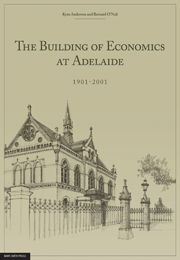Book contents
- Frontmatter
- Contents
- List of charts and tables
- Preface
- A chronology of the building of Economics at Adelaide
- Chapter 1 Birth and adolescence, 1901-1949
- Chapter 2 Growth and adaptation, 1950-2001
- Chapter 3 Prospects for the next century
- References
- Appendix 1 Biographies of staff who became Professors
- Appendix 2 Charts
- Appendix 3 Tables
Chapter 2 - Growth and adaptation, 1950-2001
Published online by Cambridge University Press: 05 June 2012
- Frontmatter
- Contents
- List of charts and tables
- Preface
- A chronology of the building of Economics at Adelaide
- Chapter 1 Birth and adolescence, 1901-1949
- Chapter 2 Growth and adaptation, 1950-2001
- Chapter 3 Prospects for the next century
- References
- Appendix 1 Biographies of staff who became Professors
- Appendix 2 Charts
- Appendix 3 Tables
Summary
For convenience, as with the first half-century of Economics at Adelaide, the second half also is split into three periods: until Peter Karmel became Vice-Chancellor of Flinders University in mid-1966; from then until Frank Jarrett's retirement in 1988, during which time Jarrett held the George Gollin Chair and was frequently Dean of the Faculty of Economics; and the period since then when Jonathan Pincus held the Gollin Chair and was Head of Economics for six of those years (1991-96, a term exceeded only by Karmel 1950-61 and Eric Russell 1967-76 – see Table 24).
The Karmel et al. years
Professor Peter Karmel's arrival in May 1950 began a major takeoff for Economics at Adelaide, aided by additional funds being made available by the Federal government for universities in the post-war era: ‘From 1950 onwards the Department was amongst the foremost in the University in expansion of teaching and research activities and growth of tenured staff of distinction’ (Edgeloe 1992, p.2). It was arguably the liveliest and best Economics Department in Australia by the early 1960s, with a growing number of staff establishing reputations nationally and ultimately internationally.
Within two years of his arrival, Professor Karmel had orchestrated the formation of a new Faculty of Economics with two separate departments, Economics (which also retained its membership in the Arts Faculty) and Commerce (to be headed by Russell Mathews on his appointment as a Reader in 1953).
- Type
- Chapter
- Information
- The Building of Economics at Adelaide , pp. 21 - 42Publisher: The University of Adelaide PressPrint publication year: 2009

